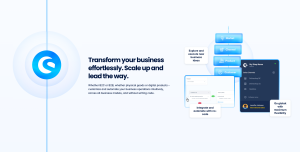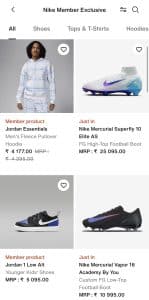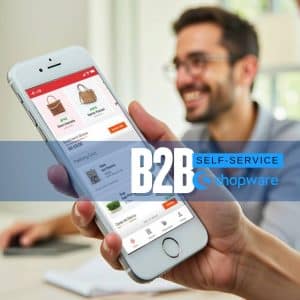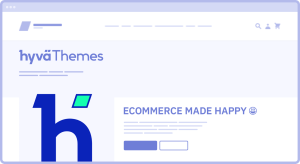Shopify’s Integrated Ecosystem and B2B Capabilities
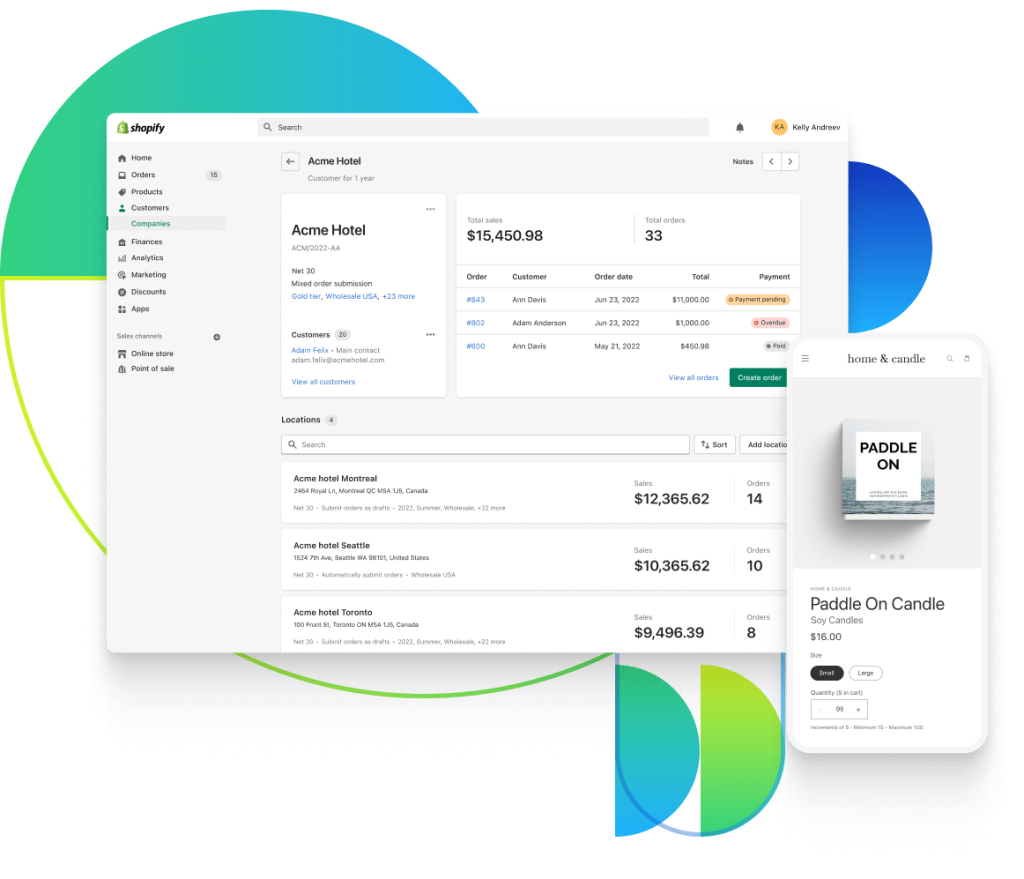
Introduction
In the rapidly evolving landscape of e-commerce, Shopify has not only set the benchmark for business-to-consumer (B2C) transactions but has also emerged as a trailblazer in facilitating business-to-business (B2B) commerce. This comprehensive exploration seeks to delve into the intricate details of Shopify’s B2B platform, highlighting its seamless integration within the expansive Shopify ecosystem. The objective is to provide B2B merchants with an exhaustive understanding of how this integrated approach, combined with insights from Shopify’s own B2B solutions, offers a potent and adaptable choice, elevating their wholesale operations to new levels of efficiency and flexibility.
Shopify’s B2B Capabilities within the Ecosystem
At the core of Shopify’s B2B capabilities lies its deep integration within the larger Shopify ecosystem, as outlined on Shopify’s dedicated B2B page. Let’s delve into the multifaceted aspects of how B2B merchants can leverage this integration for a comprehensive and impactful e-commerce experience:
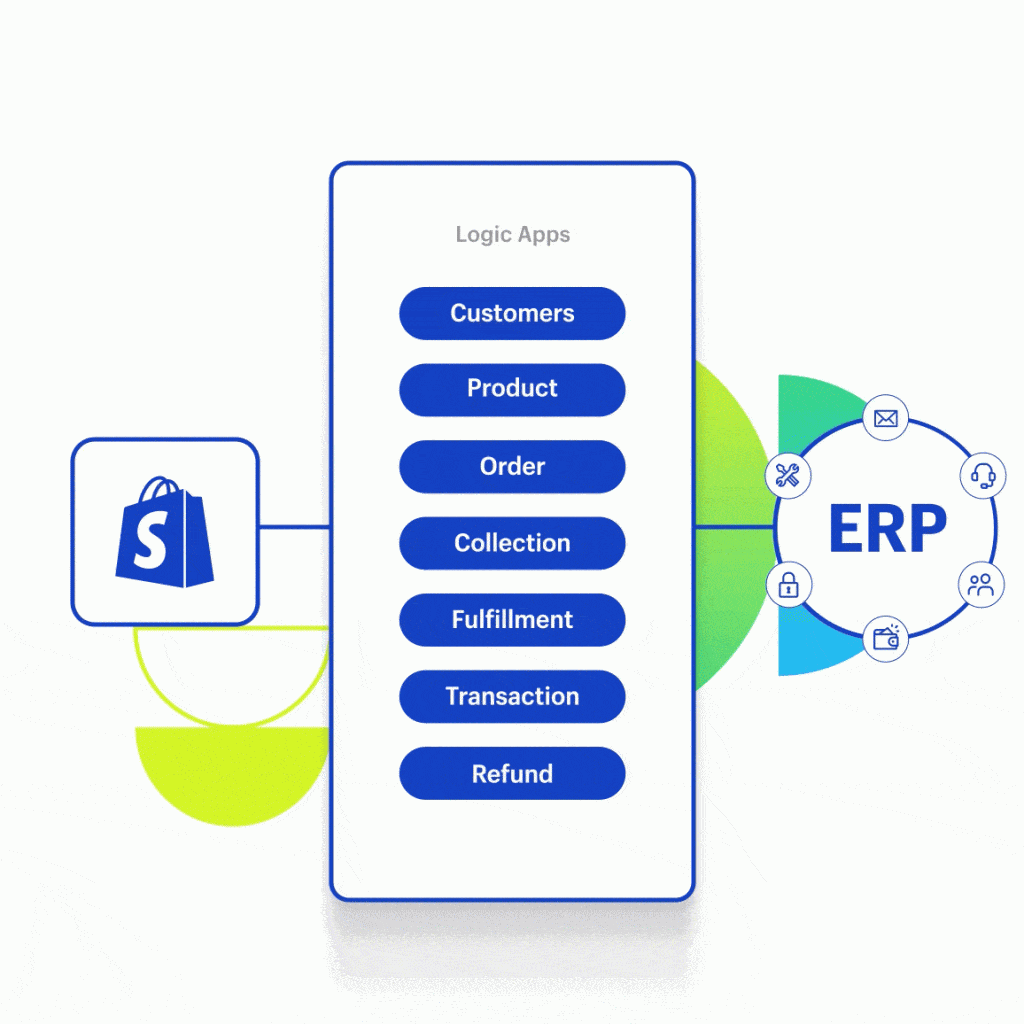
1. Unified Dashboard for Holistic Management
Operating from a unified and intuitive dashboard, the B2B platform seamlessly combines both B2C and B2B functionalities. This unified approach empowers merchants to efficiently manage the entirety of their operations, from retail to wholesale, offering a holistic view for strategic decision-making and operational efficiency. Shopify’s B2B solutions reinforce this integration, emphasizing the centralization of operations for enhanced control and visibility.
2. Integrated Inventory Management for Consistency
The advanced inventory management tools of Shopify extend their capabilities to the B2B platform, ensuring consistent tracking of stock levels across retail and wholesale channels. The elimination of siloed inventory systems fosters accuracy, streamlines operations, and encourages a unified approach to inventory control. This seamless integration aligns with Shopify’s B2B solutions, emphasizing the importance of real-time inventory visibility to prevent over-selling and streamline order fulfillment.
3. Multichannel Selling for Expanded Reach
The versatility of the Shopify ecosystem empowers B2B merchants to effortlessly engage in multichannel selling. Beyond the dedicated online store, merchants can seamlessly extend their reach to social media platforms and third-party marketplaces, broadening the scope of customer interactions and amplifying sales potential. This aligns with Shopify’s B2B solutions, which highlight the flexibility to sell wholesale across various channels to reach a broader audience.
4. Seamless Payment Integration for Efficiency
Seamless integration with Shopify Payments ensures a secure and efficient payment gateway for wholesale transactions. This integration guarantees that the payment processes for wholesale transactions align with the reliability and convenience established in the retail sphere, resulting in a seamless end-to-end experience. Shopify’s B2B solutions echo this sentiment, emphasizing the importance of secure payment processes to build trust with wholesale customers.
Key Features of Shopify’s B2B Platform
To gain a deeper understanding of Shopify’s B2B capabilities, let’s explore the key features that empower B2B merchants to navigate the complexities of wholesale commerce, drawing insights from Shopify’s dedicated B2B solutions:
1. Dedicated Wholesale Storefronts for Tailored Experiences
The B2B platform allows merchants to create dedicated wholesale storefronts, providing B2B customers with a personalized experience. This dedicated space ensures tailored product catalogs, pricing structures, and terms, aligning the wholesale experience with the unique needs of B2B clients while maintaining a cohesive brand identity. Shopify’s B2B solutions underscore the importance of a separate wholesale storefront to cater specifically to the needs and expectations of B2B customers.
2. Custom Pricing and Discounts for Versatility
Acknowledging the diversity within B2B transactions, Shopify offers the flexibility to implement custom pricing and discounts. Merchants can create tiered pricing structures, offer volume discounts, and establish specific rates for different customer segments. This versatility empowers B2B merchants to adapt their pricing strategies to the nuanced needs of their clientele. Shopify’s B2B solutions emphasize the dynamic pricing capabilities to accommodate the unique requirements of different B2B customers.
3. Streamlined Ordering Processes for Efficiency
Efficiency is paramount in B2B transactions, and Shopify’s B2B platform addresses this with features such as bulk ordering and quick reordering. These functionalities streamline the purchasing process for wholesale customers, allowing them to add multiple products to their carts and easily replicate previous orders. The result is a more efficient and user-friendly ordering experience. Shopify’s B2B solutions highlight the efficiency gains through streamlined order processes, reducing friction in the buying journey for wholesale customers.
4. Customer Segmentation and Targeted Marketing
The platform supports advanced customer segmentation, enabling targeted marketing efforts based on various criteria. Whether it’s location, purchasing history, or order frequency, B2B merchants can tailor their marketing strategies to specific customer segments. This personalized approach enhances customer engagement, fosters loyalty, and contributes to long-term business relationships. Shopify’s B2B solutions underscore the importance of personalized marketing to strengthen connections with B2B customers and drive repeat business.
The Power of Choice for B2B Merchants
The integrated nature of Shopify’s B2B platform is not just a solution; it’s a strategic choice for B2B merchants seeking an adaptive and flexible approach to wholesale transactions. This section explores how this power of choice manifests for B2B merchants, drawing insights from Shopify’s dedicated B2B solutions:
1. B2B is Included in Your Shopify Plus License
Shopify B2B is part of every Shopify Plus license. The Shopify B2B features are integrated into the Shopify Plus plan and do not require additional third-party apps or sales channels. This means that when you purchase a Shopify Plus license, B2B capabilities are included as part of the plan, reflecting in the overall Shopify pricing.
2. Scalability for Business Growth
Shopify’s B2B platform is inherently scalable, accommodating the growth trajectory of businesses engaged in wholesale trade. Whether a business is in its early stages or is an established player, Shopify’s scalable architecture ensures seamless adaptation to evolving needs, providing a future-proof solution for B2B enterprises. Shopify’s B2B solutions emphasize the scalability of the platform to meet the evolving demands of growing businesses.
3. User-Friendly Interface for Seamless Navigation
Despite the depth of its features, Shopify’s B2B platform maintains the user-friendly interface that is synonymous with the broader Shopify ecosystem. This commitment to user experience reduces the learning curve for administrators and wholesale customers alike, fostering a seamless and intuitive navigation experience. Shopify’s B2B solutions highlight the importance of an intuitive interface to enhance the overall user experience for both merchants and wholesale customers.
4. Enhanced Customer Experience for Satisfaction
The dedicated wholesale storefronts, streamlined ordering processes, and personalized pricing contribute to an enhanced overall customer experience for wholesale buyers. The user-centric approach ensures that B2B customers can navigate the platform effortlessly, leading to increased satisfaction and the likelihood of repeat business. Shopify’s B2B solutions echo this sentiment, emphasizing the role of a positive customer experience in building lasting relationships with B2B clients.
5. Streamlined Operations Through Automation
Automation is a cornerstone of Shopify’s B2B platform, streamlining various aspects of wholesale operations. From order processing to inventory management, the platform automates repetitive tasks, saving time and reducing the likelihood of errors associated with manual data entry. This automation fosters operational efficiency, allowing B2B merchants to focus on strategic initiatives. Shopify’s B2B solutions underscore the efficiency gains through automation, enabling businesses to streamline operations and enhance overall productivity.
6. Data-Driven Decision-Making for Business Insights
Shopify’s B2B platform generates valuable insights through analytics and reporting
tools. B2B merchants can leverage this data to make informed decisions, optimize pricing strategies, and identify trends in wholesale transactions. This data-driven approach empowers B2B businesses to stay agile in a dynamic market landscape. Shopify’s B2B solutions highlight the importance of analytics in gaining actionable insights for strategic decision-making.
Built-in Wholesale Features

Now, let’s delve into the specific built-in wholesale features offered by Shopify, as outlined on Shopify’s dedicated B2B solutions page:
- Company profiles
Represent multiple buyers and locations with unique payment terms and user permissions.
- Customer-specific product publishing
Offer a curated buying experience with product catalogs assigned to a specific buyer or location.
- Personalized B2B store
Create a unique buying experience for each customer with Liquid support for store themes, email templates, and branding.
- Quantity rules
Create conditional rules for products and variants, including minimums and maximums, case packs, and increments.
- Price lists
Set customer-specific prices and assign them right to the company profile without the use of tags or apps.
- Net payment terms
Automatically assign payment terms while tracking and collecting on orders as they become due in the admin.
- Company metafields
Optimize your order process by adding custom data fields to companies and locations.
- Easy reordering
Encourage recurring sales by making it easy for customers to reorder frequently.
- Flexibility getting paid
Streamline the order process with drafts, payment reminders, invoices, and due-on-fulfillment terms.
- Checkout to draft
Simplify workflows and quote proposals with the ability to review and approve orders in the admin.
- Vaulted credit cards
Speed up payment processes by letting customers securely store their card on file at checkout or in customer accounts.
- Customizable B2B logic
Build delivery and payment logic tailored to your customers right in the checkout using Shopify Functions.
- Self-serve purchasing
Scale your operations with hands-off purchasing and order tracking for easy account management.
- Global expansion
Reach wholesale customers around the world with localized storefronts, currencies, and tax exemptions.
- Custom B2B solutions
Build the solution your business needs with our suite of B2B APIs and compatible apps. Learn how to build B2B solutions
Websites using Shopify B2B
Shopify empowers B2B enterprises with tools for streamlined ordering, personalized pricing structures, and efficient account management. Now, let’s take a peek into how Shopify is making B2B commerce easy with a few real-life examples. These websites showcase how businesses leverage Shopify to create seamless and tailored B2B experiences, providing insights into the platform’s adaptability, scalability, and commitment to fostering growth in the business-to-business realm.
- Booklinen

Issue:
Brooklinen started in 2014 as a bootstrap venture, initiated by founders Rich and Vicki Fulop. Their successful Kickstarter campaign centered around the concept of offering exquisite bed sheets at an affordable price, resonating with their audience of online-savvy millennials. With substantial growth and expansion, particularly on Shopify Plus, Brooklinen has evolved into a notable example of a new wave of direct-to-consumer (DTC) businesses targeting digitally-native buyers.
Presently, the brand aims to expand its B2B operations to accommodate the increasing number of customers placing substantial wholesale orders. Nicolas Lukac, Director of Emerging Channels at Brooklinen, explains, “The core of our B2B business is really the hospitality business. Right now all of that is handled offline. There’s no way for our customers to have a personalized experience like our DTC customers do online.”
Traditional B2B sales processes are deemed outdated, involving a time-consuming and manual method of receiving orders over the phone. The Brooklinen team acknowledges their history of managing B2B orders manually since the brand’s inception. However, they recognize that continuing this ad-hoc approach would be challenging to scale and achieve the same success as their DTC endeavors.
Resolution:
To address its challenges, Brooklinen turned to the robust and flexible B2B features offered by Shopify Plus. Elizabeth Bell, Director of Product Management at Brooklinen, recalls, “When Shopify announced that they were going to be releasing B2B functionality, it was really natural for us to just opt in”
While Brooklinen’s previous manual process functioned, it lacked efficiency as customers couldn’t independently place orders. With B2B on Shopify, Brooklinen developed an intuitive B2B site that mirrored the ease of use of their DTC site, maintaining the necessary complexity for B2B transactions.
“B2B on Shopify allows us to engage with these customers in a new way—kind of like a typical DTC customer but for B2B,” notes Kelly Hallinan, Senior Vice President of Emerging Channels.
In a world where online purchasing is the norm, Shopify Plus empowers Brooklinen to stay at the forefront of the industry by providing personalized buying experiences tailored to the unique needs of each B2B customer. Hallinan mentions, “Now, we can see that a large hospitality group purchased from us six months ago. We know the average amount of time in between orders, and we can say, okay, we’re at that point where we can send them an email asking about placing a reorder. It’s much harder to do that without Shopify’s back end system”
Outcome:
With B2B on Shopify, Brooklinen seamlessly integrated a dedicated B2B store into their existing admin interface. Elizabeth Bell expresses appreciation for having B2B functionality in the Shopify Admin, allowing them to leverage familiar tools to set up their B2B site.
B2B customers no longer need to place bulk orders over the phone. They now enjoy a personalized buying experience with the ability to place orders themselves, accessing specific prices, products, and payment methods akin to any other Brooklinen purchase.
According to Nicolas Lukac, this platform opens numerous possibilities for their team, redefining their approach to customer experience. It also enables Brooklinen to automate back-office tasks, redirecting their focus towards strategic initiatives for B2B business growth and scalability.
Thanks to Shopify Plus, Brooklinen witnessed significant outcomes:
- Allocating 80% of their time to customer interaction.
- Enabling self-serve options for customers to manage accounts and orders.
- Offering an equally intuitive, branded buying experience for B2B customers as enjoyed by DTC buyers.
“On Shopify Plus, our team has the liberty and the space to build relationships with customers, instead of just transacting with them. We spend more time understanding our customers and less on manual inputs. This allows us to provide exceptional experiences for our DTC, B2B customers and retail customers alike.”
Nicolas Lukac — Director of Emerging Channels at Brooklinen
En Gold
Issue:
Since the beginning, En Gold has been all about connecting directly with customers through their online store. It’s been a good strategy, but as they looked at the bigger picture of the furnishing industry, they realized they needed to step into the wholesale and trade world. That’s where the idea of a business-to-business (B2B) sales model came in. The only hiccup? They didn’t have the right tools for it right away.
On top of that, customizing their website to cater to different types of customers was a bit of a headache. One clear example was the struggle with shipping costs. They couldn’t adjust it based on the order size, so every order got hit with the same delivery fee, no matter how big or small. This wasn’t just a headache; it was costing them money.
Solution:
En Gold made a smart move when they switched to Shopify Plus in November 2021. This decision turned out to be a game-changer, especially with the handy checkout extensibility feature. Now, they can easily tweak the checkout page to deal with challenges like adjusting shipping charges based on the order size and getting more detailed customer data.
By bringing in Shopify Plus B2B, a bundle of built-in features neatly integrated into the Shopify admin for B2B transactions, En Gold gave their online store a serious makeover. It’s now a digital hub that caters seamlessly to both regular shoppers and businesses. Thanks to these changes, when B2B customers log in, they get a tailored experience with access to personalized product catalogs and pricing structures designed just for them. It’s a win-win for En Gold and its customers.
Result:
With the help of checkout extensibility, En Gold tackled the ongoing issue of miscalculating shipping charges for big customer orders. This move closed the gap between what it actually cost to ship items and what customers were being charged. Beyond that, En Gold stepped up its customer service game by tweaking the checkout process and gathering more info about customers.
Creating a mixed store allowed En Gold to not just grow its business-to-business (B2B) side but also made it easy for the ecommerce team to handle both direct-to-consumer (DTC) and B2B sales. Introducing a tiered discount system, the brand rewarded bigger B2B buyers with more significant savings. En Gold is optimistic that this personalized approach will be a game-changer in boosting its total B2B sales.
“What I love about Shopify is that it is constantly evolving at a rapid pace, which is evidenced by additions such as checkout extensibility. We are excited to further leverage customizations and create a tailored experience for our B2B customer accounts.”
Yuki Maeda — Digital Marketing & Ecommerce Specialist
Tile Cloud
In 2017, TileCloud emerged, founded by Mark Wilkinson, Florence Kelly, and Drew Mansur. Their vision was to revolutionize the Australian tile market, aiming to redefine home renovations as enjoyable passion projects rather than overwhelming endeavors.
Challenge:
In just a few years since TileCloud started, they saw their business take off, reaching an impressive monthly revenue of $1.2 million. Wanting to keep up this incredible growth, TileCloud decided to step up their game. They planned to upgrade their website to serve both individual customers (DTC) and businesses (B2B) better, all while expanding their B2B side to bring in more wholesale customers. The TileCloud team knew that to keep sales flowing through both channels, they needed to create a seamless experience for customers in both markets.
A big part of making TileCloud’s online store even better was keeping a close eye on what was happening on their website. They needed easy access to detailed metrics to help them make smart decisions for growing the business. However, getting this kind of useful data turned out to be a bit of a challenge for TileCloud.
Solution:
TileCloud made a significant move by switching to Shopify Plus in July 2020, unlocking a game-changing feature – the ability to launch expansion stores. Leveraging this, TileCloud created a special online store exclusively for its wholesale customers. This dedicated B2B store allowed TileCloud to customize the shopping experience for its wholesale clients, offering different prices based on their unique partnerships with TileCloud.
Thanks to Shopify Functions, a feature that allows backend coding, TileCloud revamped its checkout process for a smoother user journey. One standout improvement was the capability to apply multiple automatic discounts during checkout, ensuring both B2B and individual customers enjoyed a more seamless discount experience.
Using Shopify Plus’s feature to preconfigure website data, TileCloud set up a tailored view of its website activity reports. This provided the company with better insights into key metrics like average order value, crucial for assessing the impact of online promotions and enhancing the overall customer experience. This valuable data serves as a guide for further optimizing TileCloud’s online sales channels.
Results:
Switching to Shopify Plus brought some impressive improvements for TileCloud. The smoother checkout process and other features boosted the overall customer experience, leading to higher conversion rates and an increase in the average order value. TileCloud’s dedicated store for wholesale customers also played a significant role, helping them attract more wholesale buyers. The personalized pricing, targeted messages, and special promotions tailored for individual buyers contributed to driving more sales.
Having access to detailed metrics from Shopify Plus turned out to be a game-changer. TileCloud used this valuable data to make smarter decisions. They fine-tuned their online stores, improved sales campaigns, and honed their strategies for attracting and keeping customers. Essentially, the data-driven approach empowered TileCloud to enhance the overall customer experience and refine various aspects of their business.
“Shopify Plus was like an Excel spreadsheet; we didn’t realize how much it could do until we started exploring its features. And with a combination of clearer access to our numbers and support of our merchant success manager, we have been able to make a series of changes, elevating our online experience for both retail and trade customers.”
Drew Mansur — Co-Founder
4. Laird Hamilton
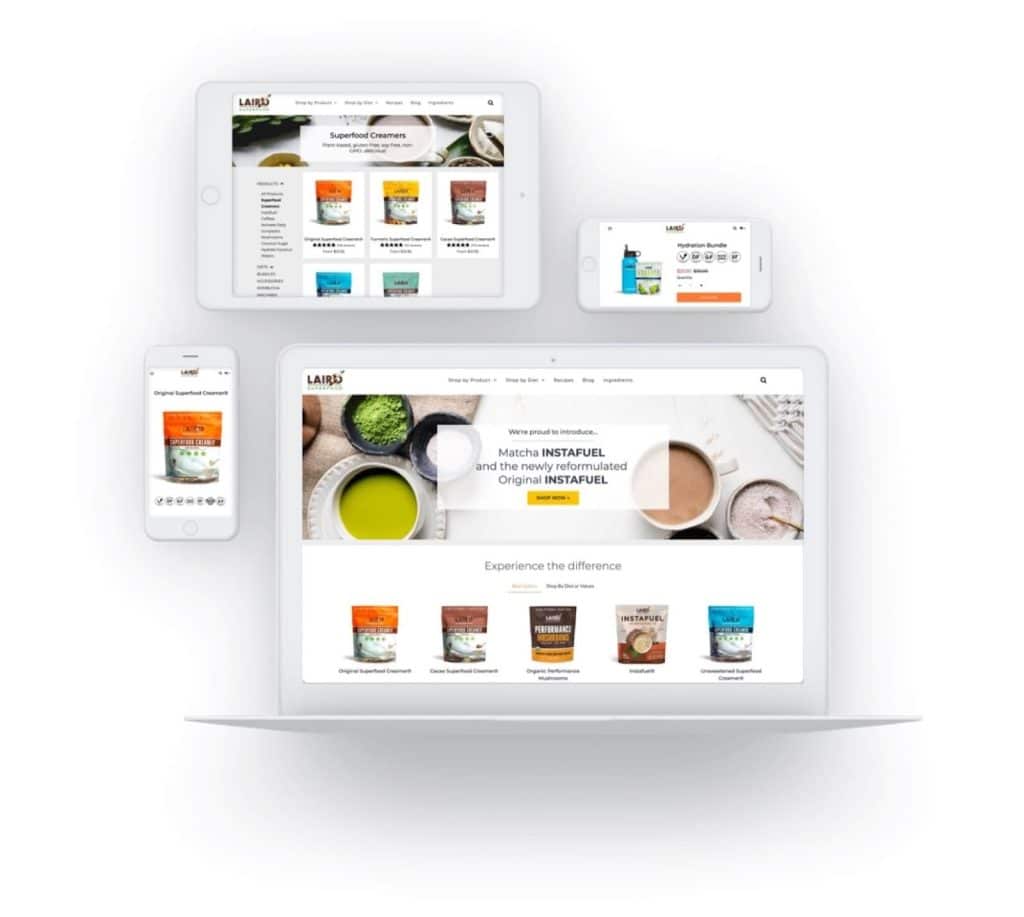
With Shopify Plus, Laird Superfood has enjoyed:
- 550% quarter-over-quarter sales growth
- Sales growing 15% month-over-month
- A wholesale channel that now outpaces consumer sales
Challenge:
Picture the Laird Superfood headquarters in central Oregon—like a bustling telethon set. Phones were ringing incessantly, and the office was abuzz with staffers darting around, energetically answering calls and swiftly typing away at their computers.
What’s the buzz all about? They were managing wholesale orders. Although Laird Superfood had mastered the art of online consumer business, their wholesale operation lacked sophistication. There was a period when the company could solely handle wholesale orders through traditional methods—via phone calls or emails.
“It was a really labor-intensive and time-consuming process,” says Paul Hodge, Hamilton’s founding business partner and Laird Superfoods’ CEO. “We needed to switch. We needed a robust platform that offers an automated wholesale portal customers can access anytime they like.”
Solution:
Back in 2016, Laird Superfood made a significant shift to Shopify and later upgraded to Shopify Plus. One of the main priorities on their list during this transition was a complete overhaul of their wholesale portal, aiming to elevate their business-to-business (B2B) revenue stream.
What they discovered was a fresh backend experience—an upgraded wholesale storefront that seamlessly integrated their existing branding and automatically adapted for mobile, all without incurring extra development or coding expenses. This transformation meant that wholesale customers could now place and monitor orders in a manner that Laird Superfood had never been able to provide before.
Their B2B experience felt like shopping as a regular consumer. Laird Superfoods’ wholesale portal not only offered password-protected logins for their business customers but also provided the flexibility to set customized or negotiated pricing exclusively accessible to specific clients. It wasn’t just dependable and scalable; most importantly, it was effective, always ready to accept orders around the clock.
“Being able to automate the wholesale process changes how we build our team. It prevents us from missing 2 a.m. orders and keeps our customers from having to wait to place an order until we’re in the office. It just solves so many problems.”
Luan Pham — CMO
Result:
The new wholesale portal at Laird Superfoods not only streamlined the company’s operations but also significantly enhanced the customer experience. Placing orders became a breeze as customers could simply log into the portal at any time, eliminating the need for phone or email interactions with a Laird Superfood sales representative. Checking order history became more straightforward, with readily available invoices providing customers with the visibility they were missing before. The convenience extended to order tracking as well, with the portal ensuring that all shipments were easily traceable through readily accessible shipping information.
“It’s fair to say that having the wholesale portal will save us the equivalent of one employee a year. That’s $50,000-$60,000 a year, and covers the cost of Shopify Plus several times over.”
Paul Hodge — CEO
Wholesale is transforming this business. While it used to make up 25% of Laird Superfoods’ sales, Hodge predicts that soon it could contribute to a whopping 75% of their total revenue.
The market outlook is undeniably positive. Laird Superfood recently secured an impressive $32 million in funding, led by tech firm WeWork, which plans to make Laird Superfoods’ products available to its members and employees.
5. Momofuku
Since 2004, David Chang’s Momofuku Noodle Bars have been winning over dedicated fans worldwide. So, it was no surprise that in 2021, when Momofuku introduced its first packaged noodles (part of the pantry staples available on its Momofuku Goods site), they flew off the shelves, selling out in under 10 minutes. This success wasn’t a one-time occurrence; Momofuku is well-acquainted with achieving sales of $100,000 in less than an hour and up to $500,000 in a single day.
To manage this remarkable growth, Momofuku needed a platform that could handle high-volume traffic and sales. That’s where Shopify Plus came in. By integrating its operations, finance, and sales through the platform, Momofuku expanded into new markets, including wholesale. Tailored solutions like Shopify Scripts and Shopify Flow, which automates tasks like launching sales campaigns, played a crucial role. Seamless app integrations, including collaboration with Shopify Plus Partner ShipHero, enabled Momofuku to fulfill up to 30,000 orders per month effortlessly, all while maintaining focus on creating the next fan-favorite product and growing its B2B operations.
Thanks to Shopify Plus, Momofuku experienced rapid and impactful results
- Exponential growth in sales thanks to integrations with ShipHero
- The solid foundation to conduct B2B sales, including wholesale orders for large US-based retailers
- Seamless automated solutions to launch flash sales campaigns and new products
“Shopify Plus is the backbone of our business. As we continue to grow, Shopify Plus and ShipHero will grow with us. They are the scaffolding. They’re the lattice upon which this entire thing is built. We can focus on growing the business, focus on new markets, and not have to worry about the operational logistics that they provide for us.”
Bob Kim — Head of IT
Conclusion
In the competitive and ever-evolving landscape of e-commerce, the power of choice becomes a strategic advantage. Shopify’s B2B platform is not just a standalone solution; it’s a dynamic choice that enables merchants to navigate the intricacies of wholesale commerce while fully capitalizing on the capabilities offered by the Shopify ecosystem. With its user-friendly interface, advanced features, and seamless integration, Shopify’s B2B platform stands as a testament to the platform’s commitment to empowering businesses of all sizes and complexities. This integrated approach redefines how B2B merchants approach wholesale transactions, offering not just a solution but an expansive and adaptable ecosystem that propels businesses toward sustained success. As B2B commerce continues to evolve, Shopify remains at the forefront, empowering merchants with the tools they need to thrive in the competitive B2B landscape. The insights from Shopify’s dedicated B2B solutions reinforce the comprehensive nature of Shopify’s offerings, further solidifying its position as a leader in the B2B e-commerce space.

